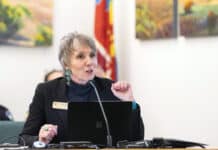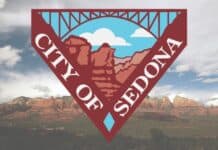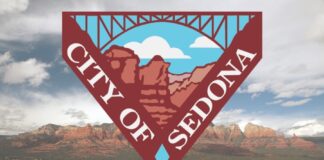Members of the Verde River Basin Partnership have a conundrum.
They do not understand why the cities and towns in the Prescott area are not joining in the partnership. Because of that, the federal government will not fork over any money to pay for the U.S. Geological Survey scientific studies the partnership states will aid in managing water planning and management strategies for the Upper Verde River Watershed, according to partnership member Tom O’Halleran.
According to a map of the area, the watershed extends from an area north and west of Paulden, called the Big Chino, down to the headwaters of the Verde River, through the Verde Valley, past Camp Verde to near the Salt River north of Phoenix.
The partnership recently requested $5.5 million to fund the scientific studies for the partnership which were required. They received a letter from U.S. Sen. John McCain [R-Ariz.] dated Nov. 20, that the request was denied.
In his letter, McCain gave the reason that, “Several key local governments have opted to shun the partnership rather than pursue it as an opportunity for additional federal support with their neighbors.”
“They’ve never officially come out against the studies; they’ve just shunned the partnership. The latest reason they give is that the partnership is dysfunctional,” O’Halleran said. “We’ve done what the government asked us to do under Title II, the only thing is we don’t have the Prescott area on board.”
The partnership was created under Public Law 109-110, the Northern Arizona Land Exchange, Title II and the Verde River Basic Partnership Act of 2005, introduced to Congress by McCain. The partnership was to identify and implement comprehensive science-based policies, projects and management activities and prepare a plan for conducting water resource studies.
No later than four years after enactment of the act, which was Nov. 22, 2005, the partnership must submit a final report. According to partnership Chairman Edward W. Wolfe, a report was tendered by the deadline.
What O’Halleran does not understand is why the Prescott area does not want to be a part of the movement to get the studies done, because many of their organizations dealing with water issues have the same goals as the partnership — to have a sustainable water supply for everyone into the future.
“I don’t know why they don’t want to come on board. I wish they would tell us. You have to understand the resource you want to protect — in this case our water supply. It’s impossible unless we get these studies done,” O’Halleran said.
He said once the studies are completed and the information gets out to the public, the partnership will dissolve.
Yavapai County District 1 Supervisor Carol Springer said she believes the partnership is already dissolved; it technically no longer exists. Springer is the county supervisor for the Prescott area.
“The bill called for a final report as of Nov. 22, 2009. Nothing in that legislation has come to pass. As far as I’m concerned [the partnership] does not exist,” Springer said. “There were specific things that were supposed to happen on specific dates. None of that has transpired.”
She said, however, she thinks there can never be enough studies so communities can accurately plan for water supply sustainability.
She thinks there already is an avenue to have those studies accomplished through the Yavapai County Water Advisory Committee, whose purpose is to provide water management strategies.
“I think our water should be managed by the people elected to do that. The WAC members are elected officials from every city, town, community in Yavapai County, and the county, along with the Arizona Department of Water Resources,” Springer said. “We have all of those entities who truly are knowledgeable in place. It seems to me it would be just as well to have funding come to the WAC.”
In the partnership, she said the feeling was there was simply not a broad enough representation and there were a lot of stakeholders not invited to the table.
Springer said WAC asked for funding to do scientific studies but has been ignored just like the partnership.
“It’s easy to blame the folks on this side of the mountain for being the reason they didn’t get the money. The reason they didn’t get the money is McCain never asked for it,” Springer said.
She said McCain sent a letter to President George W. Bush asking for the money, but according to Springer, the president does not appropriate money; Congress does.
“All he needed to do was ask for it in a bill or another bill as an appropriation. He did neither,” Springer said.
Attempts to reach McCain to verify Springer’s statement were unsuccessful by presstime.
Springer did say if anyone can figure out a way to get funding for further studies through USGS that would be a good thing.
O’Halleran was confused by Springer’s statement.
“That’s an interesting statement. If you say that and don’t want to join the partnership, knowing that’s what will get the money, I don’t understand,” O’Halleran said.





















